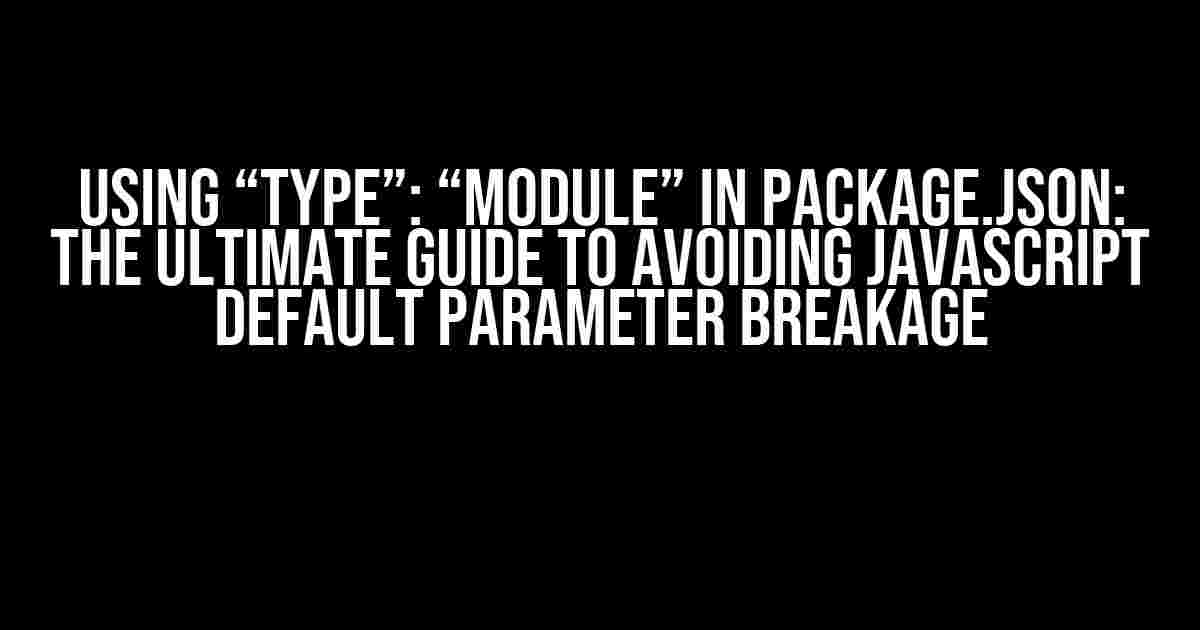Are you tired of dealing with the pesky issue of JavaScript default parameters breaking when using “type”: “module” in your package.json file? Look no further! This comprehensive guide will walk you through the why, what, and how of this common problem, providing clear and direct instructions to get you back to coding in no time.
The Problem: JavaScript Default Parameters Breakage
When you use “type”: “module” in your package.json file, you’re telling Node.js to treat your JavaScript code as ES modules. Sounds great, right? Unfortunately, this setting can cause issues with JavaScript default parameters, leading to unexpected behavior and errors in your code.
But why does this happen? It’s because the “type”: “module” setting requires Node.js to use strict mode, which changes the way default parameters are handled. In strict mode, the default value of a parameter is only set when the parameter is undefined, not when it’s null. This can lead to problems when you’re relying on default parameters to work as expected.
The Causes: Common Scenarios Where Breakage Occurs
Before we dive into the solutions, let’s take a look at some common scenarios where JavaScript default parameters breakage occurs when using “type”: “module” in package.json:
- Function Defaults: When a function is called without a parameter, the default value is not set, leading to unexpected behavior.
- Object Defaults: When an object is created with default values, those values are not set when using “type”: “module” in package.json.
- Array Defaults: When an array is created with default values, those values are not set when using “type”: “module” in package.json.
The Solutions: Fixing JavaScript Default Parameters Breakage
Solution 1: Use the **default** Keyword
One way to avoid breakage is to use the **default** keyword when defining default parameters. This ensures that the default value is set regardless of the “type”: “module” setting:
function myFunction(x = 10) {
console.log(x); // 10, even when called without arguments
}
myFunction(); // outputs 10Solution 2: Use the **||** Operator
Another way to avoid breakage is to use the **||** operator to set default values. This approach works by setting the default value only when the parameter is undefined:
function myFunction(x) {
x = x || 10;
console.log(x); // 10, even when called without arguments
}
myFunction(); // outputs 10Solution 3: Use a Default Value Function
If you need to set default values for multiple parameters, you can create a default value function. This approach is useful when you have a complex set of default values:
function getDefaultValues() {
return {
x: 10,
y: 20,
z: 30
};
}
function myFunction(opts = getDefaultValues()) {
console.log(opts); // { x: 10, y: 20, z: 30 }, even when called without arguments
}
myFunction(); // outputs { x: 10, y: 20, z: 30 }Solution 4: Avoid Using Default Parameters Altogether
If you’re not relying heavily on default parameters, you can simply avoid using them altogether. This approach is straightforward, but it might require more code changes:
function myFunction(x) {
if (x === undefined) {
x = 10;
}
console.log(x); // 10, even when called without arguments
}
myFunction(); // outputs 10Best Practices: Writing Robust Code with “type”: “module”
- Use the **default** keyword or **||** operator to set default values.
- Avoid relying on default parameters for critical functionality.
- Test your code thoroughly with and without default parameters.
- Consider using a linter or code analyzer to catch potential issues.
Conclusion: Mastering “type”: “module” in package.json
In conclusion, using “type”: “module” in package.json can cause JavaScript default parameter breakage, but with the right solutions and best practices, you can avoid these issues and write robust, modular code. By following the guidelines outlined in this article, you’ll be well-equipped to tackle the challenges of ES modules and take your coding skills to the next level.
| Solution | Description |
|---|---|
| Use the **default** keyword | Sets default values using the **default** keyword |
| Use the **||** operator | Sets default values using the **||** operator |
| Use a default value function | Sets default values using a default value function |
| Avoid using default parameters | Avoids using default parameters altogether |
Here are 5 questions and answers about “Using “type”: “module” in package.json breaks JavaScript default parameters”:
Frequently Asked Question
Having trouble with JavaScript default parameters after adding “type”: “module” to your package.json file? You’re not alone! Check out these FAQs to get back on track.
What does “type”: “module” in package.json do?
When you add “type”: “module” to your package.json file, it tells Node.js to use ES6 module syntax instead of CommonJS. This allows you to use import/export statements in your JavaScript files. Sounds good, right? Except, it can break JavaScript default parameters…
Why do JavaScript default parameters break with “type”: “module”?
The issue is that “type”: “module” triggers strict mode, which changes how default parameters are handled. In strict mode, default parameters are only allowed at the end of the parameter list, causing syntax errors if you have them in the middle.
How can I fix broken default parameters with “type”: “module”?
Easy fix! Just move your default parameters to the end of the parameter list, and you’re good to go. Alternatively, you can use a transpiler like Babel to convert your code to an earlier syntax that doesn’t require strict mode.
Can I use “type”: “commonjs” instead to avoid this issue?
Yes, if you don’t need ES6 module syntax, you can revert to “type”: “commonjs” in your package.json file. This will disable strict mode and allow your default parameters to work as before. However, keep in mind that you’ll lose the benefits of ES6 modules.
Are there any other implications of using “type”: “module”?
Yes, be aware that “type”: “module” also affects how you import and export modules. For example, you’ll need to use the .mjs extension for module files, and import statements will have to be adapted accordingly. Make sure to review the Node.js documentation for more information.
